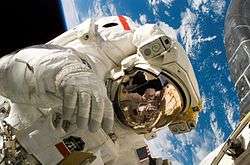Outline of space science

A laser-guided observation of the Milky Way Galaxy at the Paranal Observatory in Chile in 2010
Space science encompasses all of the scientific disciplines that involve space exploration and study natural phenomena and physical bodies occurring in outer space, such as space medicine and astrobiology.[1][2]
The following outline is an overview of and topical guide to space science:
Branches of space science

One proposed timeline of the origin of space, from physical cosmology
- Astronomy
- Outline of astronomy
- Fields of astronomy defined by approach
- Observational astronomy – Observatories on the ground as well as space observatories take measurements of celestial entities and phenomena
- Astrometry – studies the position and movements of celestial objects
- Amateur astronomy
- Theoretical astronomy – mathematical modelling of celestial entities and phenomena
- Fields of astronomy defined by approach
- Fields of astronomy defined by scope
- Astrophysics – study of the physics of the universe; of extraterrestrial objects and interstitial spaces
- Space plasma physics
- Orbital mechanics or astrodynamics, which also has applications to spacecraft
- Stellar astronomy – the study of stars
- Solar astronomy – the study of our Sun
- Planetary science – the study of planets, especially those other than Earth
- Galactic astronomy – the study of our Milky Way galaxy
- Extragalactic astronomy – the study of the larger universe beyond the Milky Way
- Physical cosmology – the study of the Universe as a whole
- Astrophysics – study of the physics of the universe; of extraterrestrial objects and interstitial spaces
- Outline of astronomy
- Aerospace engineering
Space-related interdisciplinary fields
- Astrobiology
- Astrochemistry or cosmochemistry
- Planetary science – overlaps with Earth science
- Micro-g environment research
- Forensic astronomy
- Space archaeology – the study of human artifacts in outer space
- Space medicine
- Space architecture
- Archaeoastronomy – the history of human understanding of the universe
Astronomy
See astronomical object for a list of specific types of entities which scientists study. See Earth's location in the universe for an orientation.
Space exploration
Astronautics
Astronautics – science and engineering of spacefaring and spaceflight, a subset of Aerospace engineering (which includes atmospheric flight)
- Life in space
- Living organisms in space
- Humans in space
- Animals in space
- Dogs in space
- Monkeys and apes in space
- Microorganisms tested in outer space
- Plants in space
- Space habitation
- Human spaceflight
- Living organisms in space
See also

Astronaut Piers Sellers during the third spacewalk of STS-121, a demonstration of orbiter heat shield repair techniques
- Outline of aerospace
- Space Sciences Laboratory – University of California, Berkeley
- Space exploration – includes scientific investigations through manned spaceflight and space probes
- Space colonization
- Commercialization of space
- Space warfare
- Asteroid-impact avoidance
- Space law
- Remote sensing
- Planetarium – A synthetic observatory, used for education and presentations
- Centennial Challenges NASA prize contests
- Exploration of Mars
- Human spaceflight
- Space exploration
- Space architecture
- Space colonization
- Space industry
- Space industry of Russia
- Timeline of artificial satellites and space probes
- Batteries in space
- Control engineering
- Corrosion in space
- Industry in space
- Nuclear power in space
- Observatories in space
- Orbital mechanics
- Robotics
- Space environment – study of conditions that affect the operation of spacecraft
- Space logistics
- Space technology
References
- ↑ "Space science – Define Space science", Dictionary.com
- ↑ "Space science – Definition of space science", Free Online Dictionary, Thesaurus and Encyclopedia
External links
- Institute of Space Technology, PakistAn
- Space Sciences @ NASA
- Space Sciences @ ESA
- INDIAN INSTITUTE OF SPACE SCIENCE AND TECHNOLOGY
- Space Sciences Institute
- Space Science & Technology, (Persian) an Iranian nongovernmental group who writes scientific articles about Space Science & Technology
This article is issued from
Wikipedia.
The text is licensed under Creative Commons - Attribution - Sharealike.
Additional terms may apply for the media files.
